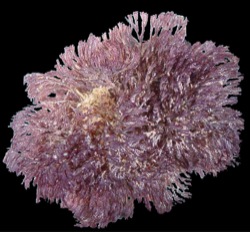 |
| A large Bugula neritina colony, from which bryostatins are produced--Courtesy of California Academy of Sciences |
Startup Neurotrope Bioscience has signed on to its second big academic collaboration since the start of the year. Its first was with Stanford University back in May; now it's teaming up with the Icahn School of Medicine at Mount Sinai in New York City to further develop its bryostatins for the treatment of Niemann-Pick disease type C (NPC), a rare disease that mostly affects children.
Classified by the FDA as an orphan disease, NPC is a type of inherited metabolic disorder known as a lysosomal storage disease. There is no cure for NPC, which causes progressive neurological problems that often result in death in affected children.
The company's Bryostatin-1 is a natural product derived from a marine microorganism called Bugula neritina, obtained by isolating it from biomass harvested from the ocean. Neurotrope is investigating the compound in a range of difficult-to-treat neurological and neurodegenerative diseases. But analogs of the compound--called bryologs--are also being studied as potential anticancer drugs and as memory-enhancing agents in other laboratories.
The license will provide the Plantation, FL-based drug developer with a 7-year period of U.S. marketing exclusivity if a drug is produced from the collaboration. The financial terms of the deal were not disclosed.
This is Neurotrope's third academic partnership to date. Last year, the company inked a deal with the Blanchette Rockefeller Neurosciences Institute at West Virginia University.
The license also covers other diseases and disorders relying on activation of PKC epsilon, an enzyme that plays a role in the health of certain cells that has been connected to NPC.
- read the press release